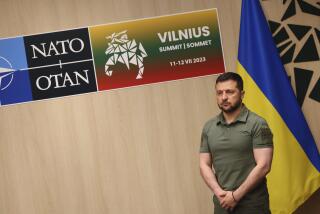Gorbachev’s European Gamble : INF Is a Down Payment, but Political Payoff Still Eludes Him
- Share via
Now that a treaty eliminating intermediate-range nuclear forces appears to be near, what does the post-INF balance sheet in Europe look like from the Soviet perspective?
Soviet leader Mikhail S. Gorbachev obviously hopes that the concessions he made on the INF issue will spur his campaign against the North Atlantic Treaty Organization’s nuclear deterrent by increasing the vulnerability of Atlanticist West European leaders to domestic pressures from anti-nuclear movements.
Moreover, Gorbachev evidently also hopes--as some in the West fear--that the removal of all European missiles down to the 500-kilometer range will eventually lead to a negotiated erosion of the rest of NATO’s deterrent. To this end, Gorbachev is likely to advance further offers calculated to promote the cause of “creeping denuclearization.”
He is helped here by West Germany’s sense of special vulnerability to the Soviets’ very short-range missile systems that will not be covered by the treaty--missiles that directly threaten West Germany but cannot reach other NATO members. We can thus expect that future Soviet proposals will seek to exploit differences between Bonn and its allies about controlling missile systems of less than 500-kilometer range.
Beyond this, the Soviet leader probably now believes that he has new opportunities to exploit the West’s differences about conventional-force reductions in Europe. Because the prospect of removal of the INF missiles reinforces West European worries about Soviet conventional superiority, the change is driving the West to place a higher priority on conventional-arms talks. Gorbachev may seek to force into the open the divisions over how much asymmetry must be demanded of Moscow in conventional reductions in order to make any agreement acceptable. The Soviet leader will probably attempt, in particular, to drive a wedge between France and sections of West German opinion.
On the other side of the ledger, all of Gorbachev’s potential gains have involved political and military costs, sometimes very serious ones. This perpetuates ambiguity and contention in Moscow as to the net profit and loss created by his policies. Thus:
--Gorbachev’s anti-nuclear campaign mixing pressure and concessions, while appealing to the West European public enough to force grudging acceptance of his INF offer by West European governments, has evoked a countermove. The Atlanticists are seeking to bolster British-French-German defense cooperation against the Soviet Union while preserving their ties to the United States. Moscow is showing increasing concern.
--The Soviets are very disturbed at France’s growing tendency to quietly increase cooperation with NATO. They are equally concerned at French efforts to combat the West German neutralist tendencies that Gorbachev wants to encourage. Meanwhile, Gorbachev’s anti-nuclear campaign, his efforts to promote West German neutralism and his notions about conventional-force reductions all attack the view of French national interests held by a broad French consensus. Gorbachev’s behavior is thus steadily undermining the traditional Soviet relationship with France as a bridgehead into Western Europe.
--Despite enormous efforts by Gorbachev’s propaganda machine to revive the European anti-nuclear movement to the scale of the early 1980s, the Soviets see the results as inadequate. For officials in Moscow, a conclusive measure of the present limits on the strength of the anti-nuclear, anti-American left in Western Europe has been its inability to displace conservative Atlanticist governments in elections in West Germany and Britain this year. These are the two major states where anti-nuclear sentiment is most strongly entrenched in the opposition.
-- Glasnost , a return to de-Stalinization and piecemeal liberalization of policy regarding dissidents and emigration are improving the Soviet image in the West and helping the Soviet peace campaign in Western Europe. But these measures are likely to become increasingly hard for Gorbachev to control without jeopardizing their external advantages, and they contain very serious latent dangers for the stability of the Soviet position in Eastern Europe. Given present trends, the possibility of a new explosion somewhere in Eastern Europe is likely to grow in the next decade.
All in all, Gorbachev has made significant military concessions as a down payment on political returns--most of which are still problematical. Despite his denials, he still hopes to promote a long-term reduction of U.S. presence and influence in Europe that would allow Soviet sheer geopolitical weight--as the only resident superpower--gradually to predominate.
But, although he is making progress in some respects, he is still very far from this goal--partly because different aspects of his European policies are mutually incompatible. How he will do in the next few years will depend in large part on the West’s ability to reach consensus on the issues that divide us in the face of the challenges that are still to come.
More to Read
Sign up for Essential California
The most important California stories and recommendations in your inbox every morning.
You may occasionally receive promotional content from the Los Angeles Times.










